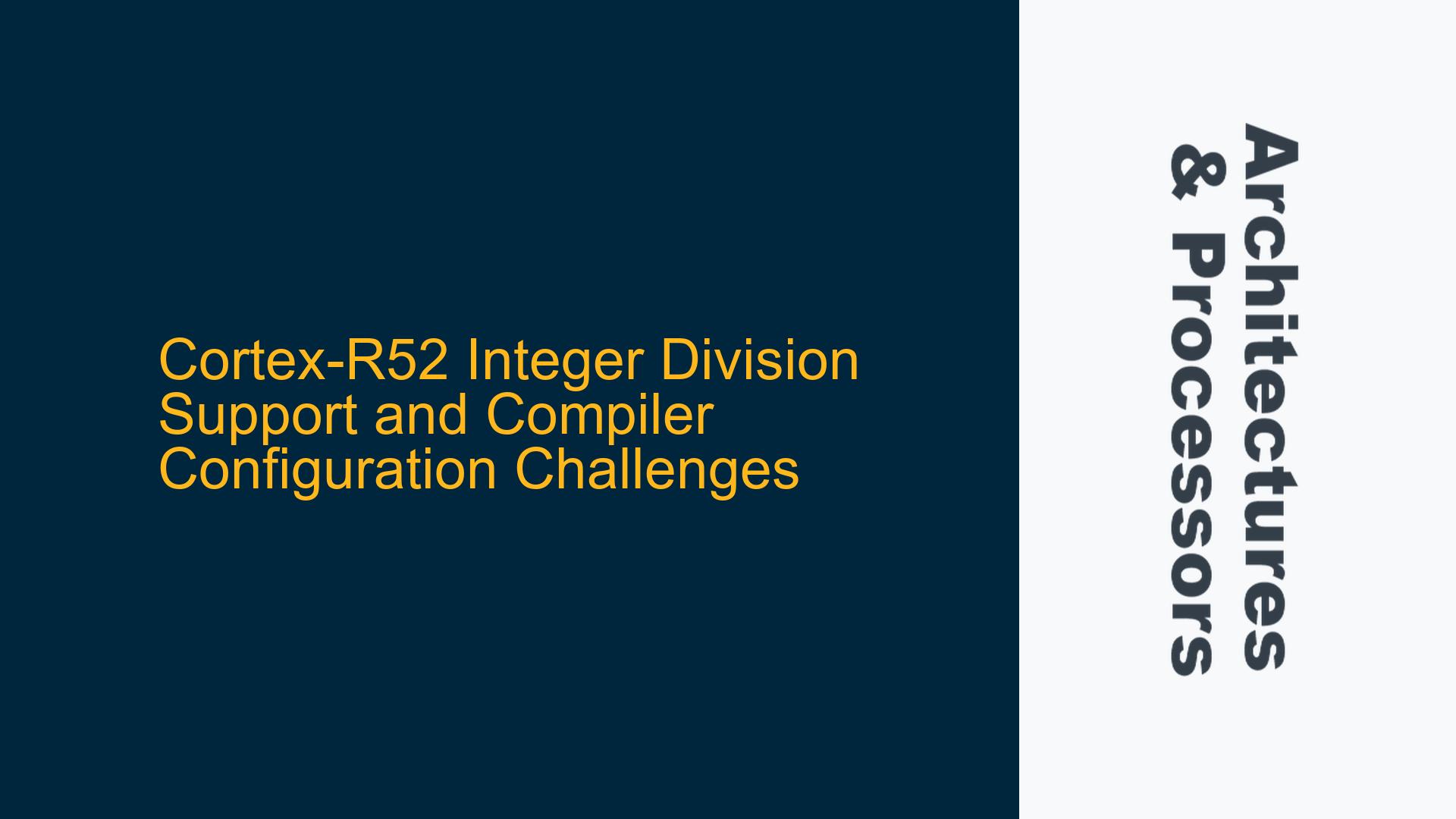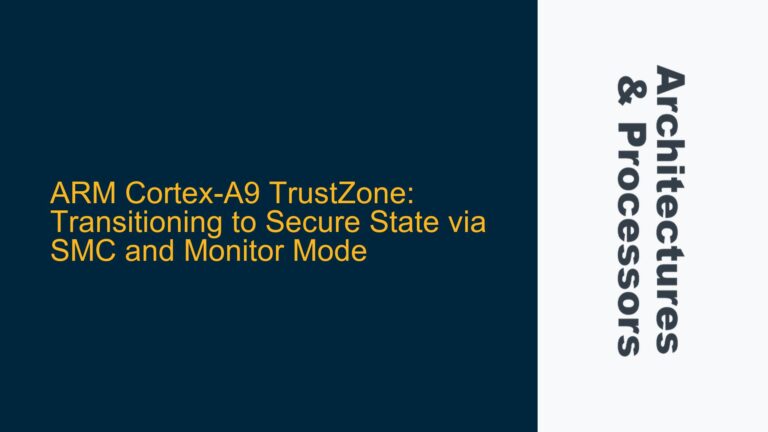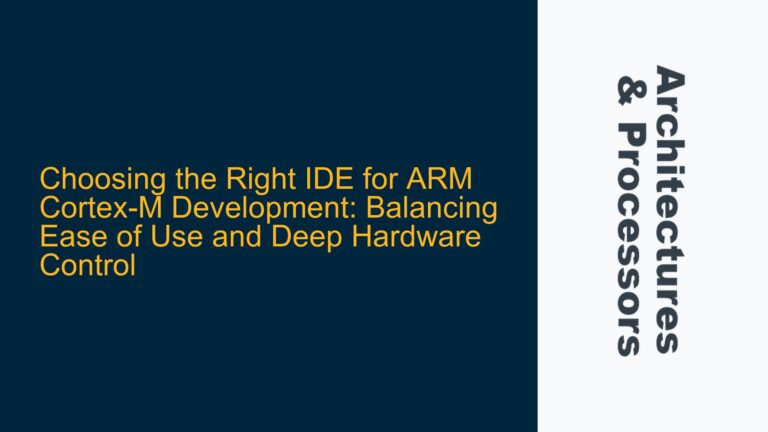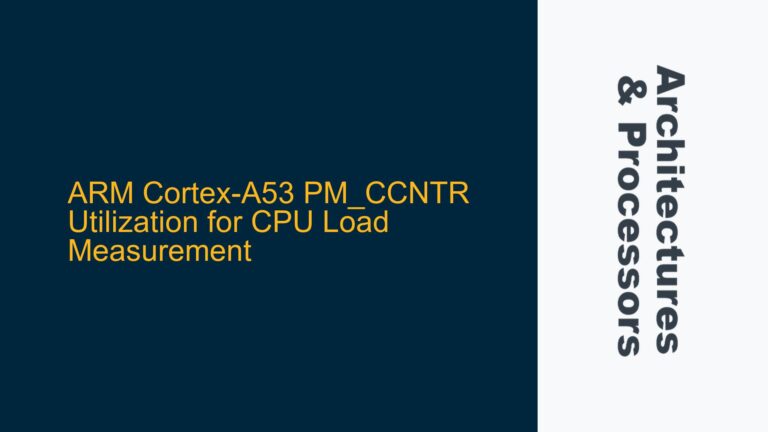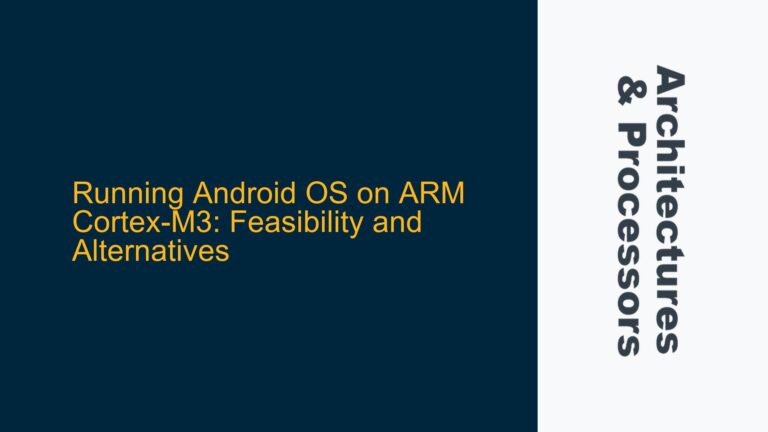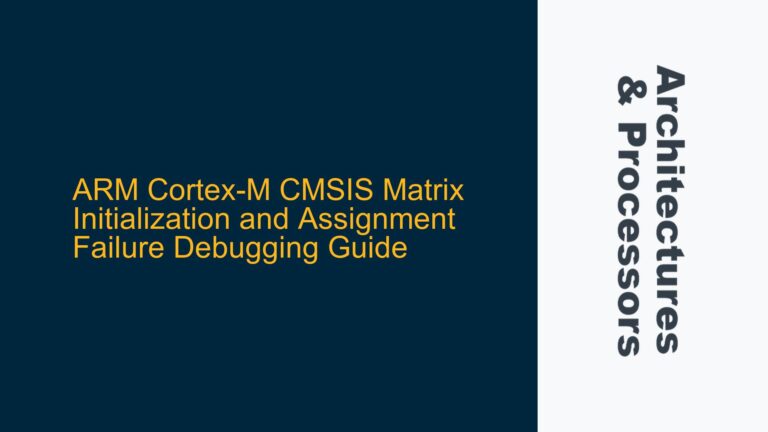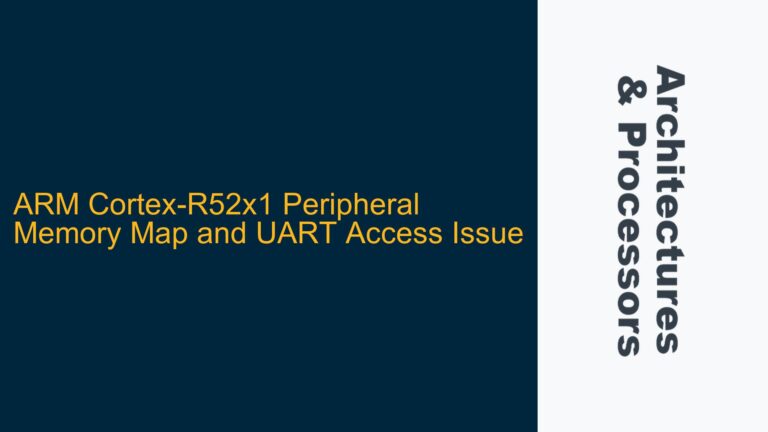Cortex-R52 Integer Division Instruction Support and GCC Compiler Flag Misconfiguration
The Cortex-R52 processor, a member of ARM’s Cortex-R series, is designed for real-time applications requiring high reliability and performance. One of its features is support for integer division instructions, specifically the UDIV (Unsigned Divide) and SDIV (Signed Divide) instructions. These instructions are part of the ARMv7-R architecture and are essential for efficient arithmetic operations in real-time systems. However, enabling these instructions in a GCC-based toolchain requires precise compiler configuration, which can be challenging due to the nuanced syntax of GCC flags and the specific requirements of the Cortex-R52 architecture.
The Cortex-R52’s integer division support is hardware-accelerated, meaning that the UDIV and SDIV instructions are executed directly by the processor’s arithmetic logic unit (ALU). This hardware acceleration significantly reduces the latency of division operations compared to software-based implementations, which rely on library calls and iterative algorithms. However, to leverage this hardware support, the compiler must be explicitly configured to generate these instructions. This involves setting the appropriate CPU architecture and instruction set flags in the GCC compiler.
The GCC compiler uses the -mcpu flag to specify the target CPU architecture and the -marm or -mthumb flags to select between ARM and Thumb instruction sets. Additionally, the +idev suffix can be appended to the -mcpu flag to enable integer division support. However, the syntax for enabling this feature is not always intuitive, and incorrect usage can lead to compilation errors, as seen in the case where -mcpu=cortex-r52+idev resulted in an "unrecognized argument" error.
The Cortex-R52’s integer division instructions operate on 32-bit values, meaning that they can only be used for dividing 32-bit integers. When dealing with 64-bit integers (e.g., unsigned long long), the compiler must resort to software-based division routines, typically implemented in a runtime library such as libgcc. These routines are significantly slower than their hardware-accelerated counterparts and can impact the performance of real-time applications.
Misconfigured GCC Flags and Unsupported Syntax for Integer Division Enablement
The primary issue in configuring the GCC compiler for Cortex-R52 integer division support lies in the incorrect usage of the -mcpu flag. The +idev suffix, which is intended to enable integer division support, is not recognized by some versions of GCC, leading to compilation errors. This misconfiguration stems from a misunderstanding of the syntax required to enable hardware division support in the Cortex-R52.
The -mcpu flag in GCC is used to specify the target CPU architecture, and it accepts a variety of suffixes to enable or disable specific features. For example, -mcpu=cortex-r52 specifies that the target CPU is the Cortex-R52, while -mcpu=cortex-r52+fp enables floating-point support. However, the +idev suffix, which is intended to enable integer division support, is not universally supported across all GCC versions. This inconsistency can lead to confusion and errors when attempting to configure the compiler.
In addition to the -mcpu flag, the -marm and -mthumb flags are used to select the instruction set for the generated code. The Cortex-R52 supports both ARM and Thumb instruction sets, and the choice of instruction set can impact the performance and size of the generated code. The -marm flag generates code using the ARM instruction set, which is generally more performant but results in larger code size. The -mthumb flag generates code using the Thumb instruction set, which is more compact but may have slightly lower performance.
When configuring the GCC compiler for Cortex-R52 integer division support, it is essential to use the correct combination of flags. For example, the following command correctly enables integer division support for the Cortex-R52 using the ARM instruction set:
arm-none-eabi-gcc -c -mcpu=cortex-r52 -marm -g -O3 udiv.c
This command specifies the Cortex-R52 as the target CPU, enables the ARM instruction set, and includes debugging information and optimization level 3. The -mcpu=cortex-r52 flag implicitly enables integer division support, making the +idev suffix unnecessary.
However, if the +idev suffix is included, as in the following command:
arm-none-eabi-gcc -c -mcpu=cortex-r52+idev -marm -g -O3 udiv.c
The compiler may generate an "unrecognized argument" error, depending on the version of GCC being used. This error occurs because the +idev suffix is not recognized by some versions of GCC, even though it is intended to enable integer division support.
Correct GCC Compiler Configuration and Handling of 64-bit Integer Division
To correctly configure the GCC compiler for Cortex-R52 integer division support, it is essential to use the appropriate combination of flags and avoid unsupported syntax. The following steps outline the correct configuration process:
-
Specify the Target CPU Architecture: Use the
-mcpu=cortex-r52flag to specify the Cortex-R52 as the target CPU. This flag implicitly enables integer division support, making the+idevsuffix unnecessary. -
Select the Instruction Set: Use the
-marmflag to generate code using the ARM instruction set or the-mthumbflag to generate code using the Thumb instruction set. The choice of instruction set depends on the specific requirements of the application, such as performance and code size. -
Enable Debugging Information and Optimization: Use the
-gflag to include debugging information and the-O3flag to enable optimization level 3. These flags ensure that the generated code is both debuggable and optimized for performance. -
Compile the Source Code: Use the
-cflag to compile the source code without linking. This flag generates an object file that can be linked with other object files to create the final executable.
For example, the following command correctly configures the GCC compiler for Cortex-R52 integer division support:
arm-none-eabi-gcc -c -mcpu=cortex-r52 -marm -g -O3 udiv.c
This command generates code for the Cortex-R52 using the ARM instruction set, includes debugging information, and enables optimization level 3. The -mcpu=cortex-r52 flag implicitly enables integer division support, ensuring that the UDIV and SDIV instructions are used for 32-bit integer division.
When dealing with 64-bit integers, such as unsigned long long, the Cortex-R52’s hardware division instructions cannot be used directly. Instead, the compiler must resort to software-based division routines, typically implemented in a runtime library such as libgcc. These routines are significantly slower than hardware-accelerated division and can impact the performance of real-time applications.
For example, the following function performs 64-bit unsigned integer division:
unsigned long long foo(unsigned long long a, unsigned long long b) {
return a / b;
}
When compiled for the Cortex-R52, the generated code will include a call to a runtime library function, such as __aeabi_uldivmod, which implements 64-bit unsigned integer division in software. The generated assembly code might look like this:
foo:
PUSH {r11, lr}
BL __aeabi_uldivmod
POP {r11, pc}
This code pushes the return address and frame pointer onto the stack, calls the __aeabi_uldivmod function to perform the division, and then pops the return address and frame pointer from the stack before returning.
To optimize the performance of 64-bit integer division, it may be necessary to implement custom division routines or use alternative algorithms that reduce the number of division operations. For example, if the divisor is a constant, it may be possible to replace the division operation with a multiplication and shift operation, which can be significantly faster.
In summary, configuring the GCC compiler for Cortex-R52 integer division support requires careful attention to the syntax of the -mcpu flag and the selection of the appropriate instruction set. The +idev suffix is not necessary and may cause compilation errors in some versions of GCC. When dealing with 64-bit integers, the compiler must resort to software-based division routines, which can impact performance. By following the correct configuration steps and optimizing the use of division operations, developers can ensure that their Cortex-R52-based applications achieve the best possible performance.
